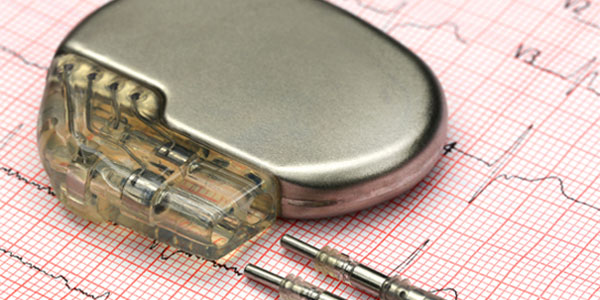An implantable device like a pacemaker or implantable cardiac defibrillator can reduce your risk of cardiac arrest due to heart rhythm disorders. In most cases, it will allow you to return to a full and active life. However, living with an implantable device does require some awareness and adjustment to certain routines and practices. Keep these tips in mind as you adjust to a “new normal.”
Continue to Treat Your Underlying Conditions

To ensure the best function of your heart and your pacemaker or ICD, you should continue to take the medications prescribed by your doctor to treat the arrhythmia or other underlying conditions.
Have Your Device Checked Regularly
Your doctor will give you a schedule for periodic appointments, probably several times a year. These non-invasive check-ups may take place in person or at home over the phone or internet, depending on your device and your health provider’s goals and preferences. The check-ups accomplish two goals: ensuring the device is working properly and monitoring how your heart is working with the device. On average, your implantable cardiac device will last five to seven years after which it or its battery must be exchanged.
Stay Active, With a Few Caveats
In general, a pacemaker allows you to resume a healthy, active lifestyle. That includes showers, sexual activity and exercise. Allow at least a week after surgery before you drive and about eight weeks before you do activities that require heavy lifting or cause sudden, jerking movement of the arm closest to the device. After that, you should mainly avoid activities that put you at risk of sudden blows to the chest, since these may damage or dislodge the device. Physical activity is important for your health; however, check with your doctor before embarking on any high-level sport or activity to make sure it’s safe for you.
Wear or Carry Medical Alert Identification
Always carry an ID card or wear a medic alert bracelet or necklace that notifies medical personnel that you have a device. This can also serve as verification if you need special treatment or services to keep you safe.
Tell Your Dentist, Doctors, Nurses and Other Medical Providers About Your Device
Certain medical procedures should not be performed on those with implantable devices because they can cause interference with the device’s signals or alter its settings. Talk to your medical professional prior to any treatment or procedure so he or she can take precautions or make alterations to care as necessary.
Avoid Exposure to Items that May Interfere With Your Device
Some security devices, technologies or electrical equipment can affect the function of your device, especially with long exposure. In an airport or store, you may pass through the security detectors without risk, but tell security personnel you have an implantable cardiac device since it may set off an alarm. Also, they should avoid using a security wand over your chest for more than a second or two. Cell phones and MP3 headphones are safe over your ears, but should not be held around the neck or stored in a chest pocket. As a general rule of thumb, the farther you can keep gadgets with an electromagnetic field from your pacemaker or ICD, the better.
Finally, know that many people struggle with depression or anxiety after having a cardiac device implanted. You may even have a form of post traumatic stress syndrome brought on by a frightening experience with your heart. Please seek help from your doctor or a licensed mental health expert if you have any of these symptoms. Caring for your mental and emotional health, along with your physical health, will allow you to fully enjoy the new life offered through your implantable cardiac device.
Related Content
Doctors at Mills-Peninsula Medical Center












